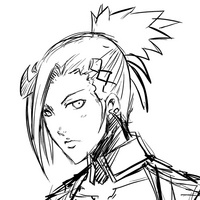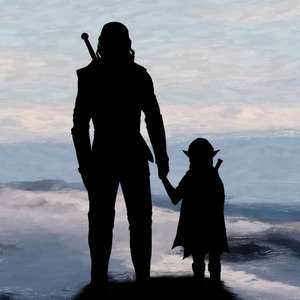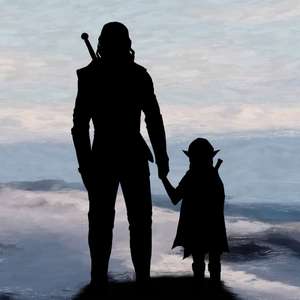Only the sages and scryers have ken of what winding paths the Fates etch out for us.
There are those points in our journey when their machinations seem cruel beyond measure, leading us down ravines of black-stone as inescapable as they are dark. And yet, there are places where one such path of tragedy intersects another, revealing not a road deeper into the abyss, but a trail out of it.
Is this rare-trod path that which the Fates planned, or an overlooked foothold of hope to be found only by those willing to escape the walls of their destiny? Even the wisest sage knows not.
This story tells of one such twisting way, weaving through darkness into light of the most uncommon color.
Our story concerns a swordsman named Jaris. Apprenticed as squire to a Knight of the Western Realm, his honor and skill grew by steps and staggers. As the years passed, he attained Knighthood and fought nobly in the faraway lands of the Crusades. Upon triumphant return he was granted a modest fiefdom in the Northlands where he made his home in a manor house atop a hill.
The Northlands lay not so far from the Hob Mountains, so named for the monstrous creatures that prowled them. The Hob were a race of creatures like Man in shape but with features grotesque—snub-nosed and dog-toothed, with slick, sallow flesh and black hair like worms. In ages past their domain was bound to the vast plains beyond the mountains. In years more recent their number grew and their chiefs became ever-bolder, first taking dominion of the mountains and then casting their shadow down onto the green foothills abutting the Western Realm.
Skirmishes between Northlander and Hob were not so uncommon, and so it was that Jaris was called, from time to time, to drive off raiders or instill fear of His Majesty in those creatures that sought to encroach upon his lands.
In the intervening periods, Jaris was afforded many days to ride between the fields. It was on such a ride among his vassals that he met Rhea, a young woman of beauty that none in the Duchy could rival. Caught by her flashing eyes the color of chestnuts as she tended the goats, Jaris wasted no time in wooing her. Before the spring crops were sown Jaris had made her his wife.
Rhea bore Jaris a fine son of flaxen hair and keen wit. Laughter rang often through the halls of the manor house as Jaris and his beloved watched young Alric toddle from swaddling clothes to boy-child. A sense of pride only a Knight can know overtook Jaris the day his son first took his father’s blade in hand, nearly half-again as tall as its unsteady wielder. Nary a man nor woman among his vassals, nor those of lands nearby, could find ill to speak about Jaris, and seeing fair Alric atop his father’s shoulders at the harvest-festival brought a smile to even the most drink-soured reveler.
Those were good days in the Northlands, but to the east in the Principality of Myr unsettling things brewed. The people there, it was known, had begun to associate openly with the Hob. Many in Myr would say this was to make peace with the creatures, that the people of Myr might live without fear of reaving and rancor. If asked, a noble of Myr would say it was to civilize the creatures, to bring to them some measure of the ways gifted Man by the gods to give him dominion over the world.
Outside Myr, however, it was whispered this was an unholy pact intended to embolden the Hob, that their aggressions might weaken the Realm and allow Myr to increase its lands at its neighbor’s expense.
There was dispute among Northlanders as to the reason, but there was none when it came to the effect: while Myr found peace and expansion to its north, the Hob were of ever-growing concern to the Realm, and so also to Jaris. Each skirmish would see a page sent by the Duke to summon Jaris, and bid him don his armor and take up his sword against the creatures who reaved the flocks of goatherds or stole into border-towns to take young men as slaves. There was little glory to be found in the battles that followed such summons, but Jaris possessed the wisdom to know that not every battle to which a Knight is called is so noble as the Crusades, but each is necessary all the same.
Though Rhea’s heart would ache on each parting-day, she knew that what he did was right and true. And so, when the page would unfurl his summons, she would hold her tongue and face Jaris with pained smile and misty eyes. Each time Jaris would stoop down from atop his steed and bestow a parting kiss on her forehead. And each time, as was the custom among the Northlanders, she would hand to him a flower of bright crimson which she had pressed with care and encircled with tiny braided wreath of flaxen hair, saying, “Keep this near to your heart, my beloved, that you might remember my love even in cruelest battle, and I shall keep this, its branch-mate, near to mine with a lock of your hair, as I wait impatiently for your triumphant return.”
And Jaris would smile and slide the token beneath his cuirass and set off with his squire and retainers. Only when his form had disappeared among the golden fields would she retreat to her chamber, where she wept, silently, that Alric would not know the fear and sorrow she felt.
Jaris, being a most capable swordsman, returned from every such excursion unharmed by the sling-stones and blood-thirsty axes of the Hob, although there were occasions on which his retainers were not so fortunate. And upon every such return, Rhea would offer silent thanks to the gods as she cast the dried petals of her token to the winds.
As Jaris would hang his sword, resting in inlaid scabbard, upon its place of honor in the hall, young Alric would watch in befitting admiration and ask, “Did you fight well, father?” And Jaris would nod, knowing without unseemly pride that he had.
The love and loyalty known between Jaris, his bride, and his young one were the envy of any Knight of the Realm. But so it is that the Fates often seem to preface the darkest of paths with those most sun-lit.
This being so, just such a path began far across the rolling hills and sharp-cut mountains in the keep of the most cunning and foul of the Hob, a chieftain of fearful cruelty and wicked ambition named Gareth. Though his fellow creatures fought with tools and tactics crude, Gareth had once been kept as a slave by a wealthy and warlike house of the Realm. Before his bloody escape he learned the clever ways of bloodthirsty Men in the arenas and battlefields of his master. Now free, he sought to apply these lessons in a quest for bitter vengeance that would consume countless souls.











Comments (0)
See all